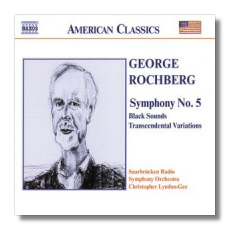
The Internet's Premier Classical Music Source
Related Links
- Rochberg Reviews
- Latest Reviews
- More Reviews
-
By Composer
-
Collections
DVD & Blu-ray
Books
Concert Reviews
Articles/Interviews
Software
Audio
Search Amazon
Recommended Links
Site News
 CD Review
CD Review
George Rochberg

- Symphony #5
- Black Sounds
- Transcendental Variations
Saarbrücken Radio Symphony Orchestra/Christopher Lyndon-Gee
Naxos 8.559115 DDD 61:03
This is the second Rochberg CD in less than a year for Naxos' American Classics series. Born in 1918 (and fortunately, still with us), his music creates difficulties for writers who want to classify his style, which has ranged from neoclassicism to serialism to what he calls ars combinatoria – the use of several different styles, even in the same work. It is often stated that Rochberg rejected serialism when his son died because it didn't provide him with an adequate medium in which to express his grief. That is partly true, but even his early compositions contain examples of how this composer hasn't been constrained by any one medium, when the message has given him a reason to go beyond it.
The Symphony #5 was written 1984-85 for the Chicago Symphony Orchestra at the request of Sir Georg Solti. What an exciting, gratifying work this is, with its echoes of composers as different as Carl Nielsen and Gustav Mahler. It was Solti's request that the work give his Chicago brass section a good workout, and Rochberg obliged. It is a 29-minute work in one movement and seven interconnected sections. Abstract but approachable, it deals with modern ideas and modern problems using a language which might be described as reactionary. Nevertheless, there's no pastiche here: just the voice of a composer who can draw strength and inspiration from just about anywhere and any time period. This is the symphony's first recording; it is a crime that Solti and the Chicagoans never recorded it. (Not that I am dissatisfied with Lyndon-Gee and his German orchestra.)
Oddly enough, Black Sounds appeared on the last Rochberg CD from Naxos, in a performance by the Boston Modern Orchestra Project. This new performance shaves three minutes off the timing of the old one, but the music doesn't sound rushed. Black Sounds was written in 1965, and, if in its wild emotionalism it sounds remarkably like the work of Edgard Varese, that's because Rochberg intended it as an homage to the older composer.
The Transcendental Variations are also getting their first recording here. This work, written in 1975, is closely derived from the slow movement of Rochberg's Third String Quartet – an important signpost in the composer's movement away from serialism. This is transcendental music indeed, allied in spirit to the late Beethoven at his most visionary. Again, it is difficult to understand why more orchestras have not programmed or recorded this work. It is accessible to any listener who can understand Barber's Adagio for Strings or Schoenberg's Verklärte Nacht.
Lyndon-Gee has more than a casual association with Rochberg and his music. In fact, Rochberg and his wife were present at the symphony's recording sessions. He seems to have a genuine affinity for Rochberg's language, and the Saarbrücken Radio Symphony plays with commitment. This is another important addition to Naxos' American Classics series, the duplication of Black Sounds notwithstanding.
Copyright © 2003, Raymond Tuttle


















